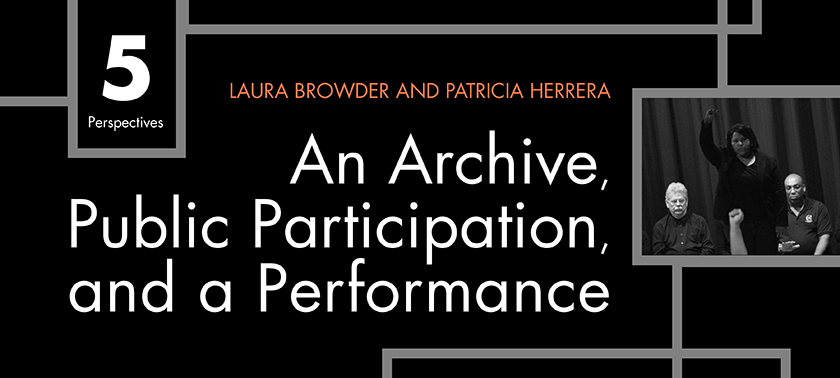
Wesley Chenault
An Archivist's Perspective
When American Studies scholar Laura Browder approached me about a possible partnership, it seemed a forgone conclusion. I saw in the project focus and intention, a university course designed around a pivotal moment in Richmond's past, resonance with a broader national narrative about efforts to engage community and remedy long-standing racial inequalities in public education. For five years, cohorts of students would research a topic, conduct oral histories, and create a play based on the information gathered. Perhaps most important, the project would document that which lived primarily in the shared memory of a group of individuals and create an archive with digital and analog components to inform and inspire generations to come.
As a professional archivist and independent scholar, managing and leading a special collections and archives department are more than routine administrative and operational functions. Like some in the field, I see archives as sites of social memory of past cultural and social norms, political systems, and multifaceted power relations. From this perspective, an archivist is far from an objective custodian of dusty records; she or he is a key determinant in what becomes social memory, what lives on to document and provide evidence of a collective past.
I bring to my position an overt interest in the politics of collection development, especially as it relates to communities that have been underrepresented or little documented in cultural institutions, and in the art of balancing collection care with promotion and use. An area of strength in Special Collections and Archives at James Branch Cabell Library is mid-twentieth and early twenty-first-century collections that document women's, African American, and LGBT histories in Richmond and in central Virginia. The Fight for Knowledge provides an opportunity not only to expand the scope of the collections but also to engage with students, scholars, and various publics in new and meaningful ways beyond standard programming models, such as exhibitions and lectures. It serves as an example of the power of archives to generate new knowledge and inspire creative works.
This collaboration models a different type of knowledge and culture production, a socially engaged practice that produces its own set of questions about memory, archives, and history. This project provides an avenue not only to critically think through the work with one another but also to foster relationships with community members, administrators, scholars, artists, and students.
The partnership also provides an opportunity to think about notions of authorship and knowledge production. While individual contributions are defined by role and expertise, the collective action of team participants moves beyond a model of individual scholarship to one where the generative work of research and authorship is somewhat shared between students; faculty and students; and students, scholars, and various publics. All the contributors take up notions of memory, history, narrative, archives, and documentation, albeit from slightly varied perspectives. When multiple experiences and fields come together around an area of focus, it can lead to a type of socially engaged knowledge production, different and new ways of understanding. For example, The Fight for Knowledge, which I consider a decided form of public scholarship, is simultaneously engaged in knowledge production and cultural production. While not explicit, it underscores the idea of research-as-process, archives-as-process, even engagement-as-process. The multivalent components of this effort—plays, oral history interviews, articles, a digital and physical repository of materials—are connected ways of participating.
In the last couple of decades, the definition of archives has expand beyond its traditional meanings of a building to store records of enduring value, a department in an institution, and a set of noncurrent records or personal papers to include bodies, feelings, and memories. While traditionally used as a noun, the use of the word has expanded to verb and adjective forms. What used to be a concept privy only to the likes of genealogists and historians now widely circulates among artists, humanists, information and technology specialists, and the general public. Listen closely, however, and one will note how meaning shifts, depending on context, sometimes in ways that elide differences in professional practices and philosophical orientations.
This suggests that the concept of archives has attained a newfound elasticity that calls attention to archives less as a place-of-stuff than to relations. Today, there are numerous examples of efforts on the part of cultural institutions not only to demonstrate relevance but also to engage their communities in meaningful and sustainable ways. I am thinking about the idea of participatory culture, which has spread across museums, libraries, and archives, refocusing mission orientations, collections, and services. Crowd-sourcing projects and community-driven digital archives, just two examples, can be found at institutions ranging from the Library of Congress to the Denver Public Library.
As this collaboration attests, archives exist in varied private and public settings, some physical, others digital or a combination of both: in community settings, museums, at religious institutions, corporations, nonprofits, government buildings, and colleges and universities. What once was a bastion of white male privilege has become more democratic and inclusive. Some archives are closed to the public, while others have a public service mandate or only require Internet access. They can be well funded and amply staffed or small operations reliant on volunteers. The majority of archives in the public sector serve broad, diverse patron bases, which might include K–12 teachers and students, amateur genealogists, general-interest researchers, and more specialized users. The recent outcry of citizens, professional organizations, and others over attempts to close the Georgia State Archives illustrates this point and demonstrates the role archives play in broad issues, ranging from government transparency to litigation to family history to elementary school curriculum.



